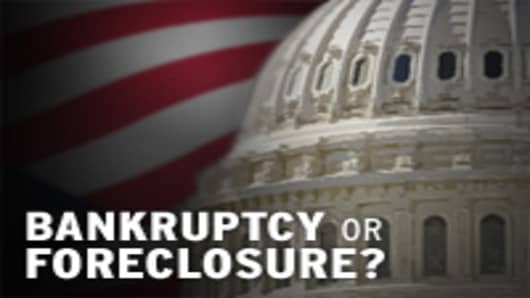As the countdown to the Obama administration falls into single digit days, the rhetoric over how to reverse the housing crisis is heating up, and much of the chatter is focusing on bankruptcy and “walkaways”.
Congressional Democrats are pushing for a plan to allow bankruptcy judges to modify home loans because current industry and government loan modification programs aren’t working. But critics of that plan argue that as home prices fall further and higher income borrowers start to tally up losses, the number of borrowers who simply decide to walk away from their debt commitments will surpass those that actually want to keep their homes.
All of this gets me thinking about the future, you know, the one that’s supposed to be so bright and all with a changing of the guard in Washington. It leads me to ask the question, which is worse to your financial future: personal bankruptcy or foreclosure?
So I put a call in to the folks over at FICO. These are the guys who invented that score that all the lending types use to determine just how much of a credit risk you are. A very affable representative of the company, Craig Watts, told me that a bankruptcy is far worse than a foreclosure because it usually involves more than one account, like credit cards or auto loans. That said, a foreclosure is still going to bash your credit score, especially if you have pristine credit.
And this is what I find so interesting. There’s all this concern out there that prime borrowers with multi-million dollar homes that have fallen in value will walk away from those homes because they don’t want to keep paying on an asset that may have negative equity. Some have even suggested that the large number of borrowers going into foreclosure will have some kind of mitigating effect on credit scores: that is, foreclosure will cease to be such a big credit risk because it’s so commonplace. “That’s nonsense,” argues Watts. “Even if the number of foreclosures has doubled, you’re still talking about 90 percent of loan holders paying their loans on schedule.”
If you have pristine credit, and you allow your home to go into foreclosure, your score will drop 200 points in a nanosecond. That means you will have a much harder time qualifying for a mortgage on another home, and if you do get one, you’ll have to pay more for it. It also means that you may have trouble renting an apartment, since landlords do check your credit score. It may even prevent you from getting certain jobs. Interestingly, if you had weaker credit before foreclosure, your score doesn’t drop as much because you were already a risk.
Personal bankruptcy is really no better, which is why I have trouble understanding why lawmakers are pushing for bankruptcy judges to modify loans. That would just give borrowers more incentive to file for bankruptcy. I guess the argument is that they have no choice, and at least bankruptcy could keep them in their homes. If the judges are going to lower the principal balance on the loan, then the borrower is essentially getting free home equity in return for a credit hit that will prevent him or her from borrowing again for a good long while.
The trouble is that in the hardest hit markets, where the bulk of the foreclosures are, home values have fallen so far that I wonder if judges will really see fit to force forgiveness on that much debt. I also wonder how many people will want to stay in homes that are worth so much less than they bargained for. The bottom line, which I’ve argued so many times before, is that homes are no longer considered a place to live. They are considered primary investments, and the bulk of those investments are currently providing no returns.
- Citigroup's Stock Plunges On Worries About Finances
Questions? Comments? RealtyCheck@cnbc.com



